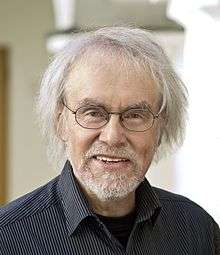Andrzej Buras
Andrzej Jerzy Buras (born 26 October 1946 in Warsaw, Poland) is a theoretical physicist, professor emeritus at the Technical University Munich (TUM). He received his master's degree in theoretical physics at the Warsaw University in 1971, and emigrated to Denmark in the same year. One year later, he received his PhD at the Niels Bohr Institute in Copenhagen. He then worked as a post-doctoral fellow at the Niels Bohr Institute until 1975. After a fellowship in the CERN theory group from 1975-1977 he was first a visitor and then a staff member in the Fermilab theory group from 1977 till 1982. He then became staff member of the Max Planck Institute for Physics in Munich (1982-1988). In 1988 finally he was appointed full professor in the Physics Department of the TUM.[1] After his retirement in 2012 he moved to the TUM Institute for Advanced Study where he is leading the focus group 'Fundamental Physics'.[2]
Andrzej Jerzy Buras | |
|---|---|
 | |
| Born | 26 October 1946 |
| Nationality | Danish |
| Awards |
|
| Scientific career | |
| Fields | Physics |
| Institutions | Technical University of Munich |
Buras is known for his early work on strong-interaction effects (QCD) in deep-inelastic electron-proton and neutrino-proton scattering (1977-1980), which led to the commonly used MS-bar scheme for QCD calculations. But his most important contributions (1983-now) are in the field of weak decays of mesons; these include high order calculations of QCD effects in most important decays, the phenomenology of CP violation and of quark flavour physics in the Standard Model and in several New Physics models.[3]
Awards
- Ordinary Member of the Bavarian Academy of Sciences and Humanities (Munich)[3]
- Foreign member of the Polish Academy of Arts and Sciences (Cracow, Poland)[4]
- Foreign member of the Polish Academy of Sciences (Warsaw, Poland)[5]
- 2004 Distinguished Lecturer of the Alberta University
- 2007 Smoluchowski-Warburg Medal of the German and Polish Physical Societies[1]
- 2008–2011 Carl von Linde Senior Fellowship at the TUM Institute for Advanced Study[6]
- 2010 Erwin Schrödinger Visiting Professorship, University of Vienna
- 2010 European Research Council Advanced Grant (2011-2016)[7]
- 2012 TUM Emeritus of Excellence
References
- "DPG - Preisträgerinnen und Preisträger 2007". Archived from the original on 29 March 2016. Retrieved 6 April 2016.
- "IAS - Alumni Focus Groups". 29 January 2016. Archived from the original on 10 October 2016. Retrieved 6 April 2016.
- "Akademie Aktuell" (PDF).
- "Polska Akademia Umiejętności - Wydział III Matematyczno-Fizyczno-Chemiczny". Archived from the original on 4 March 2016. Retrieved 6 April 2016.
- Administrator. "Foreign Members - Division III". Archived from the original on 10 June 2016.
- "IAS - Carl von Linde Senior Fellows". 5 November 2015. Archived from the original on 10 October 2016. Retrieved 6 April 2016.
- "Towards the Construction of the Fundamental Theory of Flavour".